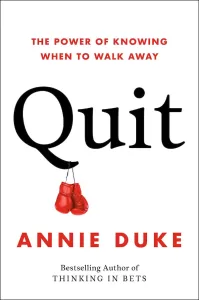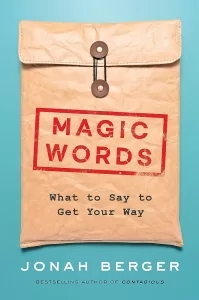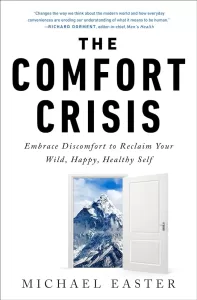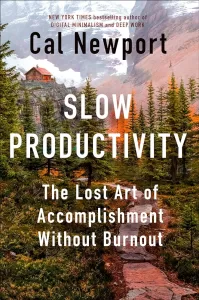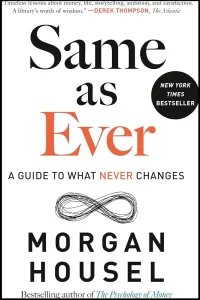Book Review: “Quit”
Book: Quit by Annie Duke
Reviewer: Bobby Powers
My Thoughts: 9 of 10
Our society applauds grit to the point of driving entrepreneurs to burnout, athletes to injury, and mountain climbers to literally die on hills rather than turning back. Simply put, most of us are bad at quitting. Duke investigates the psychological forces that prevent us from quitting and offers ideas for how to find a better balance between grit and quit.
What I Learned from the Book
Society has turned grit into a badge of honor, but there are plenty of times when it makes more sense to quit a project, job, or relationship that isn't serving you. All humans are prone to make the same sorts of mistakes with holding on too long, but thankfully, there are many things we can do to improve our ability to strategically and thoughtfully quit at the correct time, such as determining "kill criteria" in advance, enlisting someone to serve as our "quitting coach" to guide our toward better decisions, and tackling the difficult aspects of a project sooner so we can see if the project is worth the effort required. You'll find more details about each below.
Selected Quotes & Ideas from the Book
Quit Things More Often
- "By definition, anybody who has succeeded at something has stuck with it. That's a statement of fact, always true in hindsight. But that doesn't mean the inverse is true, that if you stick to something, you will succeed at it."
- "People stick to things all the time that they don't succeed at, sometimes based on the belief that if they stick with it long enough, that will lead to success. Sometimes they stick with it because winners never quit. Either way, a lot of people are banging their heads against the wall, unhappy because they think there is something wrong with them rather than something wrong with the advice. Success does not lie in sticking to things. It lies in picking the right thing to stick to and quitting the rest."
- "When the world is screaming at the top of its lungs to quit and you refuse to listen, grit can become folly."
- "If at first you don't succeed, try, try again. Then quit. There's no use being a damn fool about it." -W. C. Fields
- Angela Duckworth wrote a great book called Grit. "But anybody who reads Grit as suggesting that perseverance, absent context, is always a virtue, is misinterpreting Angela Duckworth's work. She would never say, 'Just stick with things and you'll succeed.' She has herself written about the importance of trying lots of things (which requires that you quit lots of other things) to find the thing that you want to stick with."
- "To be clear, there are lots of hard things that are absolutely worth sticking to, and resilience and grit are going to help you do that. Success is not achieved by quitting things just because they are hard. But success is also not achieved by sticking to hard things that are not worthwhile."
Quit Sooner
- "Despite the way grit and quit have been pitted against each other, they are actually two sides of the exact same decision. Anytime that you are deciding whether to quit, you are obviously simultaneously deciding whether to stick, and vice versa...Grit is what gets you up the mountain, but quit is what tells you when to come down."
- "Quitting on time will usually feel like quitting too early."
- "The problem is, perhaps because of our aversion to quitting, we tend to rationalize away the clues contained in the present that would allow us to see how bad things really are."
- "If you feel like you've got a close call between quitting and persevering, it's likely that quitting is the better choice."
A Few Examples From Poker
- "A poker table, it turns out, is a very good place to learn about the upside of quitting. Optimal quitting might be the most important skill separating great players from amateurs...Top poker players are better at quitting than amateurs in a variety of ways. The most obvious is that they know when to fold 'em."
- "A necessary part of succeeding in poker is to fold some hands that might have won. To be good at the game you just have to learn to live with that."
- "When poker players fold a hand, they are cutting their losses so they have chips to invest in another, better hand."
- "This is the fundamental truth about grit and quit: The opposite of a great virtue is also a great virtue."
Set Kill Criteria Before You Embark on Your Project
- "Making a plan for when to quit should be done before you are facing the quitting decision...the worst time to make a decision is when you're 'in it.'"
- Example: Crews ascending Mount Everest set a turnaround time before they leave Base Camp. If they haven't reached the summit by that time, they head back down the mountain—regardless of how close they are to the top. Crews that have spurned their turnaround time have occasionally died on the mountain because they've gotten stuck in bad weather and/or darkness.
- "Everyone has had the thought go through their head 'If I had known then what I know now, I would have made a different choice.' Quitting is the tool that allows you to make that different decision when you learn that new information."
- "Ask yourself, 'What are the signs that, if I see them in the future, will cause me to exit the road I'm on? What could I learn about the state of the world or the state of myself that would change my commitment to this decision?'"
- "That list offers you a set of kill criteria, literally criteria for killing a project or changing your mind or cutting your losses. It's one of the best tools for helping you figure out when to quit closer to on time."
- "Essentially, kill criteria create a precommitment contract to quit."
- "A common, simple way to develop kill criteria is with 'states and dates:' 'If by (date), I have/haven't (reached a particular state), I'll quit.'"
The Sunk Cost Fallacy
- "The sunk cost effect is a cognitive illusion where people take into account resources they have previously sunk into an endeavor when making decisions about whether to continue and spend more."
- "The sunk cost effect causes people to stick in situations that they ought to be quitting."
- "You might be experiencing the sunk cost fallacy if you hear yourself thinking 'If I don't make this work I will have wasted years of my life!' or 'We can't fire her now, she's been here for decades!'"
- "Sunk costs snowball...The resources you have already spent make it less likely you will quit, which makes it more likely you will accumulate additional sunk costs, which makes it again less likely you will quit, and so on. The growing debris of your prior commitment makes it increasingly harder to walk away."
- "Knowing about the sunk cost effect doesn't keep you from falling prey to it."
Monkeys and Pedestals
- "To help X-ers (employees who work at Google X) become better quitters, Astro Teller (CEO of X) has come up with a unique mental model that has been woven into the fabric of X: monkeys and pedestals. Imagine that you're trying to train a monkey to juggle flaming torches while standing on a pedestal in a public park...Teller recognizes that there are two pieces to becoming successful at this endeavor: training the monkey and building the pedestal. One piece of the puzzle presents a possibly intractable obstacle in the way of success. And the other is building the pedestal. People have been building pedestals since ancient Greece and probably before. The bottleneck, the hard thing, is training a monkey to juggle flaming torches. The point of this mental model is to remind you that there is no point building the pedestal if you can't train the monkey. In other words, you ought to tackle the hardest part of the problem first."
- "When X-ers give project presentations, you'll see #MONKEYSFIRST and icons of monkeys. That's their way of identifying the hard thing they have to do for the project to be worth pursuing."
- "The lesson here is, when you're starting your business, the first thing you tackle shouldn't be designing the perfect business card or investing in the most beautiful logo or coming up with the coolest name."
- Teller explains that it's best to find out if the project is feasible (if you can train the monkey) before sinking tons of money into it: "If we find the Achilles' heel, thank God we found the Achilles' heel after $2 million instead of after $20 million."
- "The sooner you figure out that you should walk away, the sooner you can switch to something better. And the sooner that happens, the more resources you're saving, which you can then devote to more fruitful endeavors."
- "One of Teller's valuable insights is that pedestal-building creates the illusion of progress rather than actual progress itself. When you are doing something that you already know you can accomplish, you're not learning anything important about whether the endeavor is worth pursuing. You already know you can build the pedestal. The problem is whether you can train the monkey."
- "Figure out the hard thing first. Try to solve that as quickly as possible. Beware of false progress."
The Endowment Effect and Status Quo Bias
- "The endowment effect is a cognitive bias where we value something we own more than we would if we didn't own it."
- "We can be endowed to objects but also to our own ideas and beliefs."
- "As we carry around beliefs and ideas, they become our possessions. We own what we've bought and what we've thought."
- "Wrapped within all these forces interfering with quitting decisions is that we do not think of sticking with the status quo as an active decision in the same way that we view switching as one. We are much more concerned with errors of commission than errors of omission (failures to act). We're more wary of 'causing' a bad outcome by acting than 'letting it happen' through inaction."
The Role of Identity
- "When it comes to quitting, the most painful thing to quit is who you are."
- "We want our identity to be consistent over time. Because our beliefs form the fabric of that identity, we are also motivated to keep our beliefs intact...what you need to understand is that we're all in a cult of our own identity."
- "We are all trying to defend ourselves against how we imagine other people are going to judge us. We get it in our heads that if we don't stick to our original choice, that will reflect negatively on us. The irony is that this desire to be viewed as rational causes us to become less rational in the decisions we make."
- "When you stake out a position that is out of the mainstream, you are more likely to escalate your commitment in the face of disconfirming information." (Based on research by Katy Milkman and John Beshears)
- "The lesson in all this is that we need to be careful about tying our identity to any single thing that we believe. And we need to be particularly cautious when a belief is outside the mainstream and public because it is so much harder to let go of those beliefs, facts be damned."
Think you’d like this book?
Other books you may enjoy:
Other notable books by the author:
Want to become a stronger leader?
Sign up to get my exclusive
10-page guide for leaders and learners.
